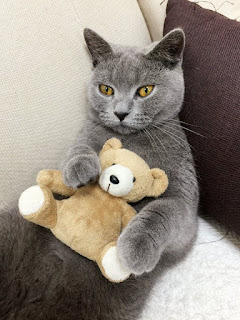"How to Prevent and Treat Hairballs in British Shorthair Cats"
As a British Shorthair cat owner, you may have noticed your feline friend occasionally coughing up hairballs. While this is a common issue for cats, it can be uncomfortable for them and may lead to other health problems if left untreated. In this article, we'll explore how to prevent and treat hairballs in British Shorthair cats.
Brush your cat regularly-
One of the most effective ways to prevent hairballs is to regularly brush your British Shorthair cat's coat. This will help remove loose hair before your cat can ingest it while grooming. Use a brush or comb that is appropriate for your cat's coat type, and be sure to brush in the direction of hair growth to avoid causing discomfort.
Offer hairball prevention products-
There are a variety of hairball prevention products available for cats, such as treats, chews, and special diets. These products are designed to help move hair through the digestive system and prevent it from forming into hairballs. Consult with your veterinarian to determine which hairball prevention products are best for your British Shorthair cat.
Increase your cat's water intake-
Dehydration can lead to hairball formation, so it's important to ensure that your British Shorthair cat is drinking enough water. Offer fresh water in a clean bowl, and consider adding wet food or water fountains to your cat's diet to encourage drinking.
Provide toys and playtime-
Providing your British Shorthair cat with plenty of toys and playtime can help encourage them to groom less and ingest less hair. Engage your cat in interactive play, such as chasing a toy or playing with a laser pointer, to help them burn off excess energy.
Use hairball remedies-
If your British Shorthair cat is experiencing hairball-related discomfort, there are a variety of hairball remedies available. These products include oral gels and pastes that help lubricate the digestive tract and encourage hair to pass through the system. Be sure to consult with your veterinarian before administering any hairball remedies to your cat.
Offer a hairball control diet--
Some cat food brands offer specially formulated hairball control diets that are designed to help prevent hairballs from forming. These diets typically contain higher amounts of fiber to help move hair through the digestive system and prevent it from clumping together. Consult with your veterinarian to determine if a hairball control diet is appropriate for your British Shorthair cat.
Consider a grooming routine-
In addition to regular brushing, establishing a grooming routine with your British Shorthair cat can also help prevent hairballs. This can include trimming your cat's hair, particularly around their hindquarters, to reduce the amount of hair they ingest while grooming. It's important to use proper grooming techniques and tools to avoid causing discomfort or injury to your cat.
Monitor your cat's behavior-
Be sure to keep an eye on your British Shorthair cat's behavior, particularly when it comes to grooming and eating habits. Excessive grooming or vomiting may be signs of hairball-related discomfort or other health issues. If you notice any changes in your cat's behavior, consult with your veterinarian.
Regular veterinary check-ups-
Regular veterinary check-ups are an important part of maintaining your British Shorthair cat's health and detecting any potential health issues early on. Your veterinarian can also provide guidance on hairball prevention and treatment strategies that are specific to your cat's needs.
Be patient-
Preventing and treating hairballs in British Shorthair cats can take time and patience. Be consistent with your grooming routine and other preventive measures, and don't hesitate to consult with your veterinarian if you have concerns about your cat's health or behavior. With proper care and attention, you can help keep your British Shorthair cat healthy and comfortable.
As a British Shorthair cat owner, it's important to be aware of hairball prevention and treatment strategies to ensure your feline friend stays healthy and comfortable. Regular brushing, encouraging water intake, providing playtime, and administering hairball remedies can help prevent hairballs from forming. Additionally, offering a hairball control diet, establishing a grooming routine, monitoring your cat's behavior, and regular veterinary check-ups are important steps to take to prevent and treat hairballs in British Shorthair cats. With these strategies in place, you can help keep your beloved pet healthy and happy.
FAQ
What causes hairballs in British Shorthair cats?
Hairballs in cats form when hair ingested during grooming collects in the stomach and forms a clump that cannot be passed through the digestive system.
Are hairballs dangerous for British Shorthair cats?
While hairballs are not typically life-threatening, they can cause discomfort and lead to other health issues such as vomiting, loss of appetite, and intestinal blockages.
How often should I brush my British Shorthair cat?
It's recommended to brush your British Shorthair cat at least once a week, or more frequently if they have a thick coat or are prone to hairballs.
Can hairball remedies be harmful to my British Shorthair cat?
Hairball remedies that are specifically designed for cats and used according to package instructions are generally safe. However, it's important to consult with your veterinarian before administering any remedies.
Can hairballs be prevented entirely?
While hairballs cannot be completely prevented, implementing preventative measures such as regular grooming, hairball control diets, and providing playtime can help minimize the likelihood of hairball formation.


.jpeg)


Post a Comment